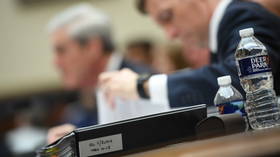What is the OLC opinion? The policy that forbade Mueller from charging Trump

With Democrats questioning Robert Mueller on whether he would have indicted President Trump for obstruction were he not elected to the White House, Mueller repeatedly deferred to the OLC opinion. But what does the opinion mean?
Testifying before the Democrat-led House Judiciary Committee on Wednesday, the former special counsel largely stuck to the confines of his report, published in April.
Though the first section of Mueller’s 440-page report states that the investigation “did not establish that members of the Trump Campaign conspired or coordinated with the Russian government” to swing the 2016 election, the second half of the report is thornier.
Also on rt.com Mueller says he found ‘insufficient evidence’ that Trump conspired with RussiansThis section outlines ten potential incidents of obstruction of justice, but ultimately declines to bring charges against Trump for any of them. At Wednesday’s hearing, Republicans hammered Mueller for including “potential crimes,” claiming that by doing so, Mueller undermined the presumption of innocence.
Democrats, on the other hand, pressed Mueller to admit that the decision not to charge Trump was driven primarily by adherence to the so-called OLC Opinion, and not by Trump’s innocence.
Rep. Lieu: "The reason again that you did not indict Donald Trump is because of the OLC opinion stating that you cannot indict a sitting President, correct?"Mueller: "That is correct."#MuellerHearingpic.twitter.com/MdSJ0rFIYt
— Josh Campbell (@joshscampbell) 24 июля 2019 г.
The Department of Justice’s Office of Legal Counsel (OLC) first determined in 1973 that a sitting president cannot be indicted for a crime, as then-President Richard Nixon faced impeachment for his involvement in the Watergate scandal. In short, it stated that a president would need to be removed from office before charges could be brought.
“The spectacle of an indicted president still trying to serve as Chief Executive boggles the imagination,” the office wrote.
The office reiterated its position in a 2000 memo, stating that the 1973 opinion was still “the best interpretation of the constitution.” Though not enshrined in US law, the OLC opinion represents long-standing Justice Department policy, and is seen as binding for federal officials.
Congressman: "Could you charge the President with a crime after he left office?"Mueller: "Yes."#MuellerHearingpic.twitter.com/ZCx89HWfE1
— Josh Campbell (@joshscampbell) 24 июля 2019 г.
At several points during Wednesday’s hearing, Mueller told Democrats that his team was aware “from the outset” that Trump would ultimately not be charged with a crime while in office, triggering accusations of “fishing” from Republicans. Mueller did say that Trump could be potentially charged once out of office, a scenario that some Democrats would no doubt be eager to see play out.
Though Mueller told lawmakers on Wednesday that the OLC opinion was the only obstacle to indictment, the former prosecutor has made contradictory claims before. In a joint statement with Attorney General William Barr in May, Mueller said that the decision not to prosecute Trump was also motivated by other legal factors. Republicans have already pounced on Mueller for his apparent misstatements.
Thus far Mueller completely contradicts what he told AG Barr about the reason not to proceed on the obstruction of justice. He told AG Barr that the decision not to proceed was not solely based on the OLC opinion but on complicated facts in the law.
— Lindsey Graham (@LindseyGrahamSC) 24 июля 2019 г.
If you like this story, share it with a friend!














